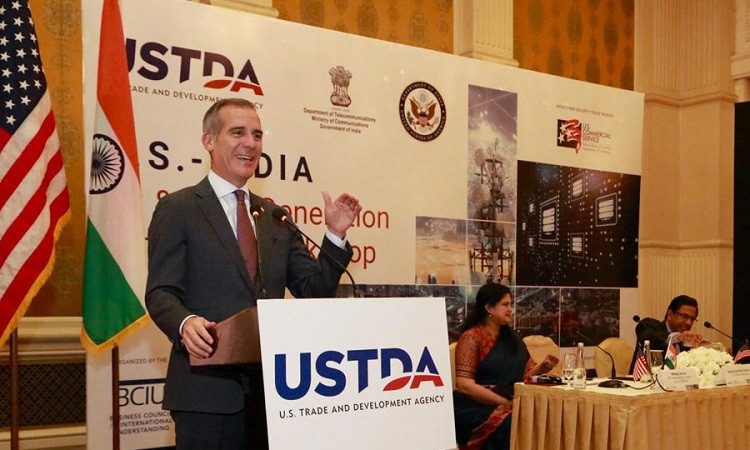
NEW DELHI: "India with its enormous population, thriving digital economy, and technology use is poised to leverage the transformative power of 5G, and in future 6G, to catapult itself to the forefront of digital innovation ” U.S. Ambassador to India, Eric Garcetti said on Tuesday.
Speaking at the workshop's opening ceremony, Garcetti said India and the U.S. know that technology is more than just higher speeds or better connectivity. It is also a gateway to growth and a reflection of development because of their shared ideals.
India is well-positioned to take advantage of the transformative potential of 5G and 6G, the U.S. Ambassador said at the workshop hosted by the U.S. Trade and Development Agency (USTDA). "India, with its vast population, its thriving digital economy, and the use of technology that in some ways is leapfrogging other nations around the world, is poised to leverage the transformative power of 5G and 6G...to catapult itself to the forefront of the digital revolution," he added. The leaders of the two countries share a vision for a digital economy based on openness, accountability to the people, the rule of law, and the defence of fundamental rights.
In contrast to those who pursue technology for other purposes, those are things that unite us. Therefore, we must consider security, trust, openness, and interoperability from the outset to develop that inclusive and digital future that nourishes these ideals, he said.
In order to encourage the responsible global deployment of 5G and next-generation networks, the U.S. is working with India and other countries. When it comes to 5G, he said, trust is a "absolute necessity." He added that the United States and India are committed to working together on this mission. "We know it's impossible to eliminate all security risks, but we can minimise the possibility that the architects who build the networks will abuse those networks to undermine its security, its confidentiality, integrity, and availability," he said.
Since their most private and sensitive information passes through networks, users must also trust them. "Trust cannot exist if they are forced by authoritarian governments to disclose data in the absence of reasonable legal discourse or disclosure," the author writes. Therefore, we are jointly developing alternatives, such as open and interoperable methodologies and architectures...," he stated.
India can assist in bringing dependable solutions and architecture to poor countries because to its G20 presidency and membership in the international organisation that this year includes 19 nations and the European Union. "In the developed world, India too can become a crucial link in our supply chain to de-risk the world," he said.
When technology is employed for good, it will advance the global economy, improve health metrics, and increase international security. he said, the connection between the United States and India is "personal," with shared ideals and "Telecom is the biggest tool for social and economic inclusion,"
India views telecommunications as the most important weapon for promoting social and economic inclusion, said theto Telecom Secretary K. Rajaraman. Therefore, it is crucial that technology be used for the benefit of the disadvantaged, said Rajaraman, who also added the several steps the Indian government has done in recent years to guarantee that tech benefits reach the "bottom of the pyramid." He stated that satellite broadband services would start up later in 2019.
Therefore, we already have a constellation of OneWeb, and we have granted them with the initial licence. We also have a different Jio Platforms licencing. Starlink is also in the conversation with us. So, the Telecom Secretary added, "We expect that by next year, we will have a fairly solid, robust network made up of all three technologies to serve every region of this country.
The cost of technology will drop and it will converge for users over the coming months and years. We believe there is a great opportunity for all of us, especially in India and the U.S., to collaborate at international fora, including the ITU where all these standards are discussed. "So it's very important that as we move up the technology chain that standards are ensured...this principle of affordability, inclusion, and at the same time move forward in the form of far greater capabilities and features...," Rajaraman said.
A "global shame...in this era of 5G and 6G, you can't have these kind of numbers in this planet, and also speaks very poorly of how technology is deployed and how tech is purposed...and we are very conscious of that," he said, referring to the fact that 2.6 billion people still lack connectivity and access to technology worldwide.
To advance a cooperative strategy, he asserted that all nations must work together and contribute to the development of technology, failing which "technology will never serve the purposes of all the sections of society across the world."